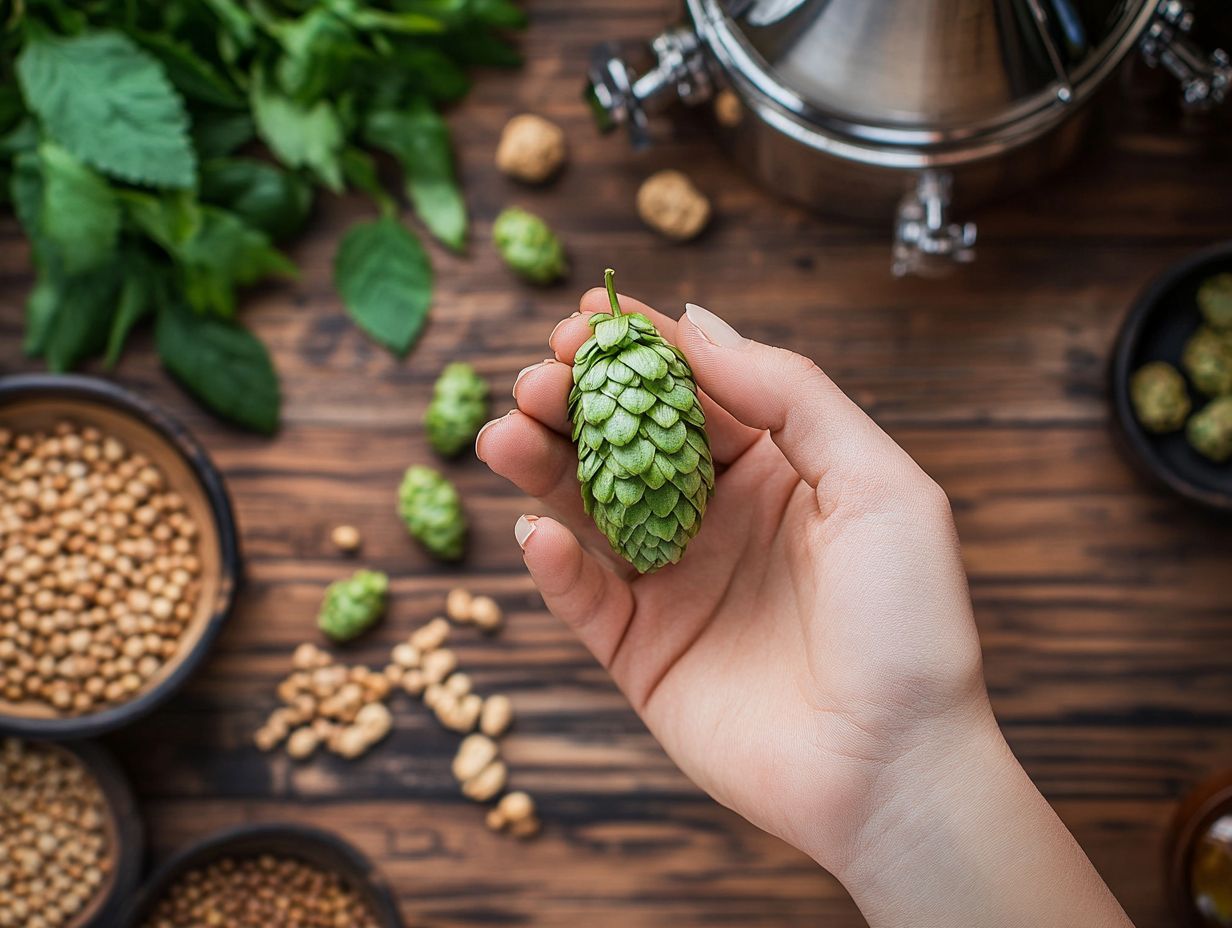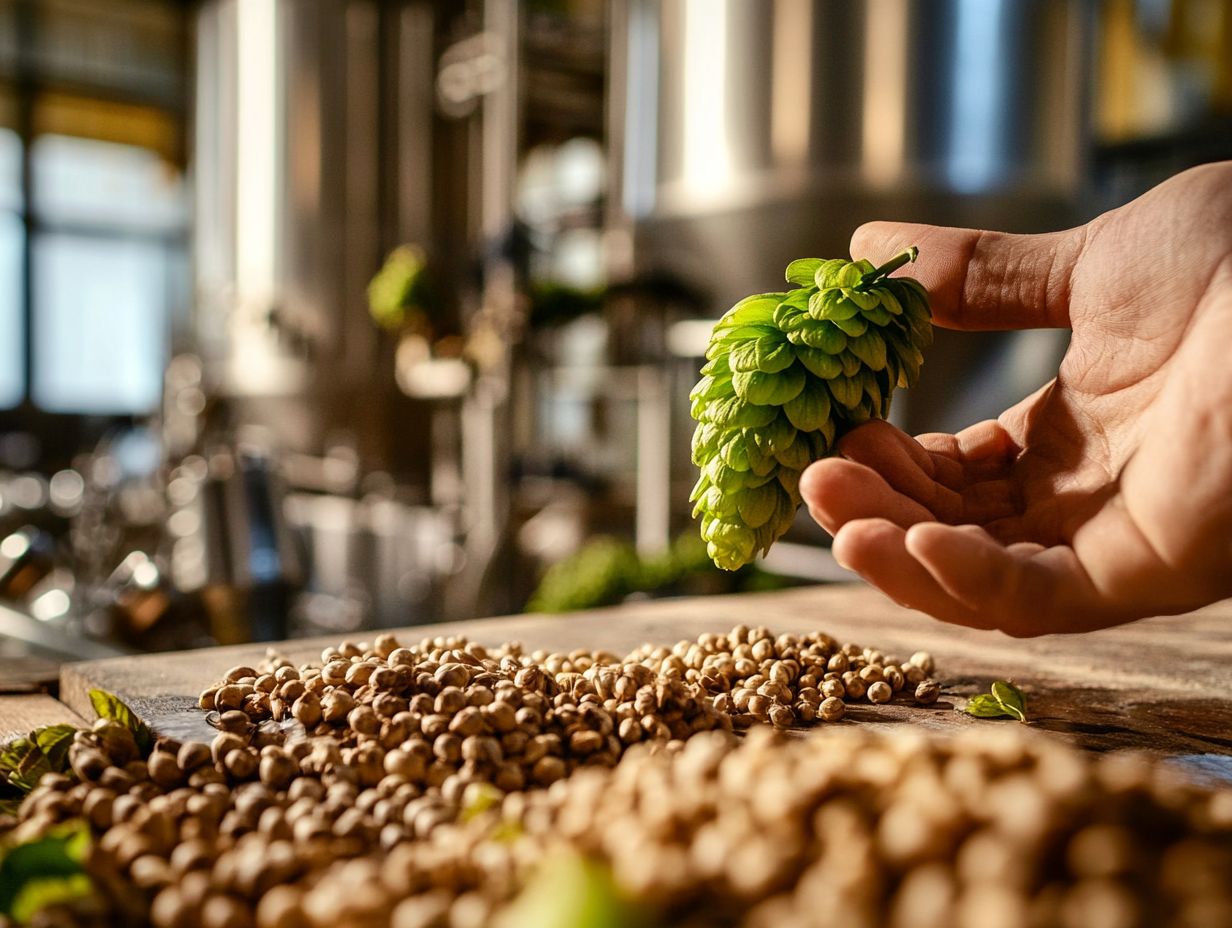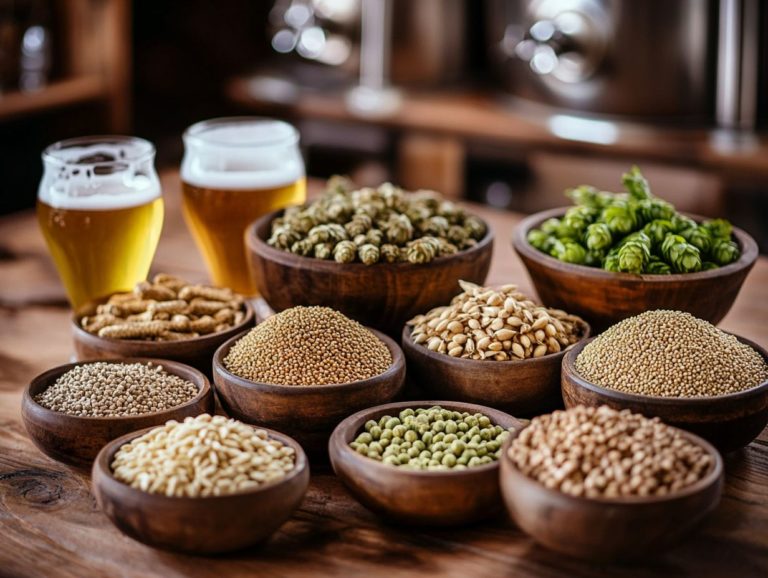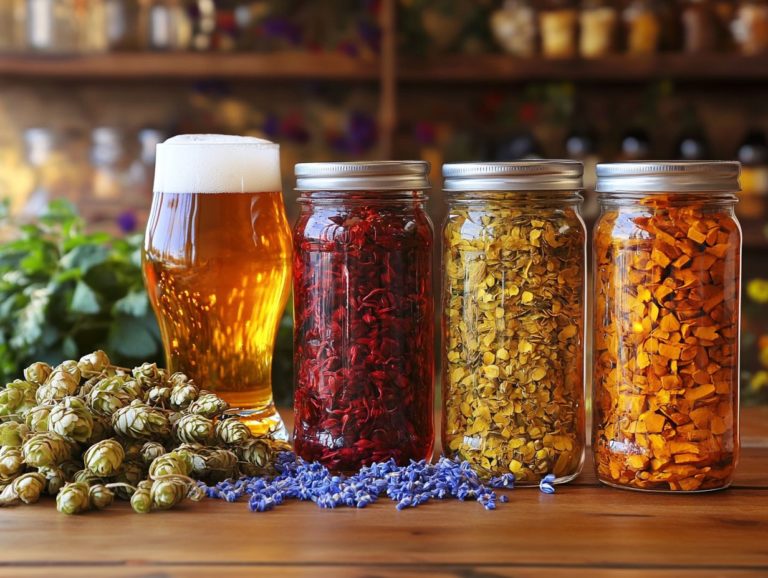How to Source Quality Ingredients for Brewing
Brewing is a captivating blend of art and science, where the quality of your ingredients can truly make or break your final masterpiece. Whether you re an experienced brewer or just beginning to explore this craft, grasping the significance of sourcing exceptional brewing materials is vital.
This article delves into the essential components of beer brewing, shedding light on the repercussions of using low-quality materials and guiding you on where to discover the finest ingredients. You’ll also find indispensable tips and insightful questions to ponder when selecting your brewing supplies, such as sourcing raw materials and understanding ingredient prices.
Prepare to elevate your brewing game to new heights, with insights from industry experts like Smith Mathews from Southbound Brewing Company and Carly Wiggins from Omnidons-Brewing!
Contents
- Key Takeaways:
- Why Quality Ingredients Matter in Brewing
- How Do Low-Quality Ingredients Affect the Brewing Process?
- Where to Source Quality Ingredients for Brewing
- 1. Local Homebrew Supply Stores and Markets
- Questions to Ask When Sourcing Ingredients
- 2. What Growing and Harvesting Methods Were Used?
- 3. Are the Ingredients Organic or Non-GMO?
- Tips for Choosing the Best Ingredients for Your Brew
- Frequently Asked Questions
- What are some important factors to consider when sourcing quality ingredients for brewing?
- Where can I find quality ingredients for brewing?
- How can I ensure the ingredients I source are of good quality?
- What are some signs of poor quality ingredients in brewing?
- Is it worth paying more for higher quality ingredients?
- Are there any alternative ways to source quality ingredients for brewing?
Key Takeaways:

- Did you know? Only the best ingredients can unlock the amazing flavors and consistency you crave in your beer!
- Local homebrew stores, online retailers, and direct sourcing from farmers are great options for obtaining quality ingredients.
- When sourcing ingredients, ask about their origin, growing methods, and if they are organic or non-GMO.
Why Quality Ingredients Matter in Brewing
Quality ingredients are the foundation of exceptional brewing, influencing everything from the flavor profiles of your final product to the overall quality of your beer. In a time when craft breweries are flourishing, sourcing high-quality brewing materials has never been more critical for you. Companies like BevSource are pivotal in helping you navigate the procurement process.
Ingredients like hops, malts, and yeast are essential in creating a unique taste and aroma. Sustainable practices in ingredient procurement not only elevate flavor but also strengthen community ties. Never overlook water quality, as it forms the base of your brew.
By grasping the significance of these quality ingredients, you can elevate your beers to satisfy the refined palates of consumers who seek community-inspired products that adhere to the highest brewing standards.
What Are the Key Ingredients in Brewing?
The key ingredients in brewing are hops, malts, and yeast, each playing a vital role in the brewing process and shaping the character of the final beer. Hops lend bitterness and aroma, while malts contribute sweetness and body. Yeast is essential for the process where yeast turns sugars into alcohol, creating those distinctive flavor profiles you know and love.
Consider the type of malt extract you choose; it can evoke a range of flavors, from the rich caramel and chocolate notes found in darker malts to the light, crisp qualities of pale malts. Meanwhile, different yeast strains add their own unique touches, influencing alcohol content while imparting fruity or spicy esters that define specific beer styles.
For example, a Belgian yeast strain might introduce delightful clove and banana hints, enriching the brew’s complexity, while an American ale yeast could deliver a clean finish that allows the hop characteristics to truly shine. Sourcing from trusted maltsters ensures your malt is of top-notch quality.
This intricate dance between malt, hops, and yeast, achieved through various combinations, ultimately crafts each beer s distinct personality and charm.
Ready to try brewing? Visit your local homebrew store today and experiment with new recipes!
How Do Low-Quality Ingredients Affect the Brewing Process?
Using low-quality ingredients can seriously compromise your brewing process. This leads to undesirable flavors and aromas that detract from the overall quality of your beer.
When your brewing materials like hops, malts, or yeast aren’t up to par, you may encounter fermentation issues. Stability problems and brewing challenges could stump even the most seasoned brewers.
Transparency in labeling and sourcing practices ensures you avoid these pitfalls. Take hops, for example.
Their selection not only affects bitterness but also contributes unique aromas and flavors that are essential to your beer s profile. If you opt for low-grade hops, you risk introducing off-flavors or lacking the aromatic qualities that make a brew truly captivating.
This can result in a flat and uninspiring outcome. Bittering hops, in particular, require careful selection to ensure a balanced flavor.
The same goes for malts; inferior options can lead to unwelcome sweetness or astringency. Compromised yeast may struggle to ferment sugars effectively, leaving you with incomplete fermentation and potential spoilage.
Therefore, sourcing high-quality ingredients is absolutely vital for ensuring consistency. Achieving the flavor profile you envision is crucial.
Establishing strong supplier relationships can help mitigate these risks. This commitment helps you make great beers that drinkers will love.
Where to Source Quality Ingredients for Brewing
Sourcing quality ingredients for brewing is crucial in your quest for outstanding beer. You have multiple avenues at your disposal to acquire these essential materials.
Understanding your brewing costs and ingredient sourcing strategies is also key to maintaining a successful brewing operation. Local homebrew supply stores often boast a diverse selection of ingredients.
These stores provide you the opportunity to connect with knowledgeable staff who can offer invaluable advice on the best choices. Online retailers present the convenience of browsing a broader market of suppliers.
This ensures you have access to a wide range of options. Attending a local farmers market can also be a great way to source fresh ingredients and connect with local farmers.
Procuring directly from local farmers fosters sustainability and strengthens community ties. Each of these methods brings its own advantages.
By understanding where to source quality ingredients, you can significantly enhance both your brewing process and the final product.
1. Local Homebrew Supply Stores and Markets

Local homebrew supply stores serve as invaluable resources for you as a brewer. They offer a carefully curated selection of quality ingredients and brewing supplies tailored to your needs.
These stores provide essential materials like hops, malts, and yeast. They also cultivate a sense of community among fellow brewers, creating a welcoming space for peer recommendations and shared knowledge.
Craft beer enthusiasts often find these local hubs invaluable for personalized customer service. They provide in-depth brewing advice.
Along with an impressive variety of grains and specialty ingredients, you ll find everything from fermentation vessels to bottling supplies. This makes these shops a convenient one-stop destination for anyone passionate about homebrewing.
Personalized customer service is a hallmark of these establishments. The knowledgeable staff are eager to share insights and advice that can help both novice and experienced brewers elevate their craft.
By engaging with your local homebrewing community, you can participate in workshops, tastings, or competitions. This further enriches your brewing experience and sparks creativity in your recipes.
The relationships you form and the expertise you gain in these stores will significantly enhance your brewing success.
2. Online Retailers
Online retailers present you with a convenient avenue for sourcing high-quality ingredients for your brewing endeavors, broadening your access to a diverse array of supplies that might not be available in your local area. With just a click, you can explore an extensive marketplace filled with various ingredients, effortlessly comparing prices and products across different suppliers to discover the best options tailored to your brewing needs.
Craft production often benefits from the wide range of choices available online. This capability empowers you to unearth unique grains, hops, and additional ingredients (that enhance flavor) that can elevate the flavor profile of your creations.
The option to read customer reviews and ratings offers you invaluable insights into each product’s reliability and effectiveness, guiding your selections. For those embarking on their brewing journey, the plethora of choices ensures you can experiment freely, unencumbered by the limitations of local stores.
To fully harness the advantages of online shopping, it s wise to prioritize reputable suppliers. By checking for certifications, return policies, and customer service responsiveness, you can ensure that the ingredients you receive are of the highest quality, ultimately paving the way for successful brewing experiences.
3. Directly from Farmers and Suppliers
Sourcing ingredients directly from farmers and suppliers allows you to obtain the freshest, highest-quality materials while simultaneously supporting sustainable practices and local agriculture. By establishing relationships with local farmers, you gain valuable insights into their growing processes, ensuring that the ingredients meet both quality and sustainability standards.
It particularly benefits breweries that emphasize community-inspired products and transparency in their production experience. This direct connection not only elevates the flavor profile of your brews but also fosters deeper connections within the community.
When you choose to source locally, you contribute to the local economy, empowering farmers and promoting eco-friendly cultivation methods. Of course, navigating challenges such as seasonal availability and fluctuating prices can be daunting.
To overcome these challenges, consider establishing long-term contracts that provide stability for both you and your suppliers. Investing time in understanding each farmer s practices can lead to a more reliable supply chain and strengthen partnerships, ensuring that both quality and community well-being remain top priorities.
Questions to Ask When Sourcing Ingredients
When you’re sourcing ingredients for brewing, asking the right questions is essential to guarantee quality and alignment with your brewing ambitions. Craft breweries often prioritize transparency and labeling to ensure that their ingredient sourcing meets high brewing standards.
Consider key inquiries such as where the ingredients were grown, the methods employed in their cultivation and harvesting, and whether they are organic or non-GMO. These questions do more than just assess the quality of the ingredients; they also guide your decisions on pricing and sourcing practices, ensuring that every choice you make aligns perfectly with your brewing vision.
4. Where Were the Ingredients Grown?
Understanding where your ingredients are grown is essential for evaluating their quality and sourcing practices. Local farmers frequently use sustainable methods that enhance flavor and freshness.
Choosing locally sourced ingredients transforms your brews into a vibrant celebration of community. By prioritizing locally sourced ingredients, you not only support your local farmers and community but also ensure that your products are of superior quality in your brewing process.
This community-focused approach fosters a deeper connection between producers and consumers, while also encouraging the preservation of regional agricultural practices. When you choose to collaborate with nearby farmers, you gain access to high-quality, seasonal ingredients that genuinely reflect the local terroir.
These ingredients are typically fresher and harvested at their peak ripeness, resulting in exceptional taste profiles for your beer brewing. By working hand-in-hand with local growers, you contribute to the local economy, creating jobs and promoting biodiversity.
Ultimately, this enhances the sustainability of the region’s agricultural landscape, benefiting everyone involved.
2. What Growing and Harvesting Methods Were Used?

Understanding how ingredients like hops, malt, and yeast are grown is crucial. Are they cultivated using traditional or innovative methods? Craft breweries often lead the way in exploring these methods.
Inquiring about the growing and harvesting methods of brewing ingredients is essential for determining their quality and sustainability. Techniques such as organic farming and farming methods that restore the health of the soil can enhance the flavor of hops and malts while promoting a healthier ecosystem. Knowledge of these methods is particularly helpful when sourcing from specific suppliers or craft breweries like Omnidons-Brewing and Southbound Brewing Company.
Practices that minimize chemical inputs and promote biodiversity result in more robust crops. By prioritizing ingredients cultivated through these conscientious methods, you open the door to richer flavors and aromas in your final product.
Timing is crucial. For instance, harvesting hops at peak ripeness maximizes oil retention, directly influencing the aromatic profile of your beer. Embracing thoughtful cultivation and harvesting methods elevates ingredient quality and showcases your commitment to sustainability and craftsmanship.
3. Are the Ingredients Organic or Non-GMO?
Confirming whether your ingredients are organic or non-GMO is vital if you prioritize quality, sustainability, and consumer preferences in your brewing process. Choosing organic ingredients often leads to superior flavor and overall beer quality, which is crucial for craft breweries striving for high standards.
Such certifications reflect your commitment to ethical sourcing and resonate with consumers who care about the origins of their food and drink. In the craft beer market, where unique flavors and distinct brewing methods are celebrated, using organic and non-GMO ingredients can enhance your brewing experience. For example, Allagash White is celebrated for its commitment to craft production standards.
These choices help reduce the environmental impact of production, foster biodiversity, and support sustainable agriculture. By aligning with eco-conscious consumer trends, you attract loyal clientele and tap into new demographics eager for authentic and responsibly crafted brews. This is particularly relevant in emerging markets across Central and Eastern Europe, including countries like Poland, Georgia, and Armenia.
Tips for Choosing the Best Ingredients for Your Brew
Sourcing brewing materials and selecting the best hops, malt, and yeast requires careful thought.
Choosing the finest ingredients for your brew demands thoughtful consideration. A few insightful tips can guide you with confidence.
Engage in comprehensive research on ingredient quality. Be mindful of your budget and read reviews to elevate your brewing endeavors. Consider reaching out to established brewing companies in Harrisburg, Illinois, for valuable insights.
By doing so, you’ll enhance your craft and create exceptional beers that truly stand out in the market. Research local suppliers for organic ingredients today!
1. Do Your Research
Conducting thorough research on potential ingredients and suppliers is essential for ensuring quality and reliability in your brewing. Your understanding of the source, growing conditions, and the reputation of suppliers can significantly impact your beer’s success. For instance, working with reputable maltsters and brewing yeast suppliers ensures higher quality and consistency.
When you investigate the origins of your hops and malt, you’ll select varieties perfectly suited to your specific styles. Engaging with local farms can lead to fresher ingredients that retain more flavor and aromatic qualities. By understanding harvesting techniques and soil conditions, you can better predict how these factors will influence your final product. Getting feedback from the brewing community provides valuable peer recommendations.
Informed decisions can elevate your brew to new heights, ensuring it stands out in a competitive market, just like the famous Belgian beers known for their superior quality and distinct flavors. Such choices also promote sustainable sourcing practices, fostering a more ethical relationship between producers and suppliers.
2. Consider Your Budget
Considering your budget when sourcing ingredients is essential, as it directly impacts your brewing costs and the quality of your final product. Striking the perfect balance between high-quality ingredients and affordability is key to successful brewing that doesn t compromise on taste. Monitoring ingredient prices and understanding market dynamics can help you make informed decisions.
You must evaluate your ingredient choices meticulously, as high-quality hops, malt, and yeast can profoundly influence your beer’s flavor. To achieve a well-rounded brew without straining your finances, exploring local suppliers or co-ops can lead to fresher ingredients at more attractive prices. For more guidance, check out this how to find quality ingredients for home brewing. Purchasing in bulk can also reduce costs while ensuring quality remains intact. BevSource is one example of a supplier that helps breweries streamline their procurement process.
Keeping an eye on seasonal availability is similarly beneficial, as certain ingredients may be more budget-friendly at various times throughout the year. Thoughtful budgeting enhances your brewing experience and opens the door to experimenting with new flavors, paving the way for exceptional beer. Local farmers markets can also be a valuable resource for sourcing fresh, budget-friendly ingredients.
3. Read Reviews and Ask for Recommendations

Reading reviews and seeking recommendations within the brewing community offers invaluable insights into the highest quality ingredients available. By engaging with fellow brewers and relying on peer suggestions, you can navigate the overwhelming array of options on the market, empowering yourself to make informed decisions. This transparency in the community can significantly enhance your production experience.
As you participate in discussions and share your experiences, you ll deepen your knowledge and cultivate a network of trusted sources. This collaborative approach allows you to gather firsthand accounts of how various ingredients, whether hops, malts, or yeast, perform in actual brewing scenarios. You may even discover new yeast strains or malt extract options that could innovate your brewing techniques.
Understanding how others have successfully utilized specific products reveals nuances and tips that standard reviews often overlook. This collective wisdom nurtures a culture of transparency and quality, elevating the brewing landscape for everyone involved. This is particularly true for niche products like bittering hops or specialty malt used in craft beer.
Frequently Asked Questions
Get insights into ingredient sourcing, brewing materials, and other brewing challenges.
What are some important factors to consider when sourcing quality ingredients for brewing?
Some important factors to consider when sourcing ingredients for brewing include:
- Freshness
- Varieties of flavors
- Quality
- Availability
- Cost
It’s critical to source fresh, high-quality ingredients to ensure the best results. Availability and cost also play a role in determining the best ingredients for your budget and location.
Understanding the labeling and standards of your raw materials provides greater transparency.
Where can I find quality ingredients for brewing?
Quality ingredients for brewing can be found at:
- Local homebrew supply stores
- Online retailers
- Directly from breweries or farms
Dive into research and compare to discover the best ingredients for your brewing adventure. Building strong supplier relationships is also key to securing the best brewing supplies.
How can I ensure the ingredients I source are of good quality?
To ensure the quality of your ingredients, it’s important to do your research and look for reputable suppliers. You can:
- Ask for recommendations from other brewers
- Join online brewing communities for feedback
- Engage with established brewing companies for insights
What are some signs of poor quality ingredients in brewing?
Poor quality ingredients can result in off-flavors, cloudiness, or a lack of fermentation in your brew. Signs to watch for include:
- Stale or musty smells
- Mold or discoloration
- Off-flavors or cloudiness
Always ensure water quality is adequate, as it plays a crucial role in the brewing process.
Is it worth paying more for higher quality ingredients?
The quality of ingredients can greatly affect the final product of your brew. While it may be more expensive, investing in higher quality ingredients often results in better tasting and more consistent brews.
When deciding which ingredients to source, weigh the cost against the potential benefits. This is especially true for yeast strains and malt extract, which significantly impact fermentation and flavor.
Are there any alternative ways to source quality ingredients for brewing?
Aside from purchasing ingredients from suppliers, you can also:
- Grow your own ingredients to ensure freshness
- Trade with other homebrewers for unique ingredients
Participating in the craft movement with community-inspired products can also enhance your brewing experience.
Ready to embark on your brewing journey? Explore sourcing your own ingredients and share your experiences in brewing communities!






